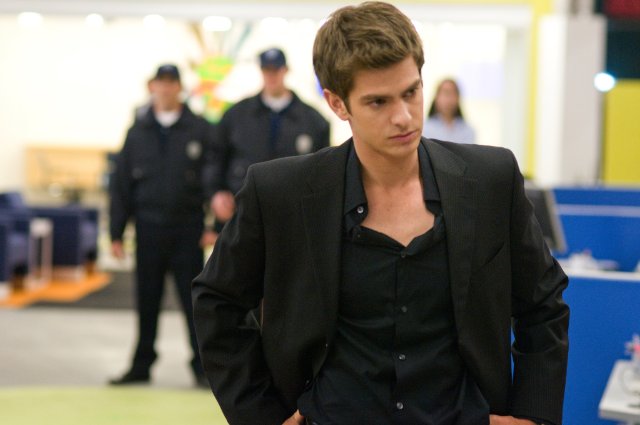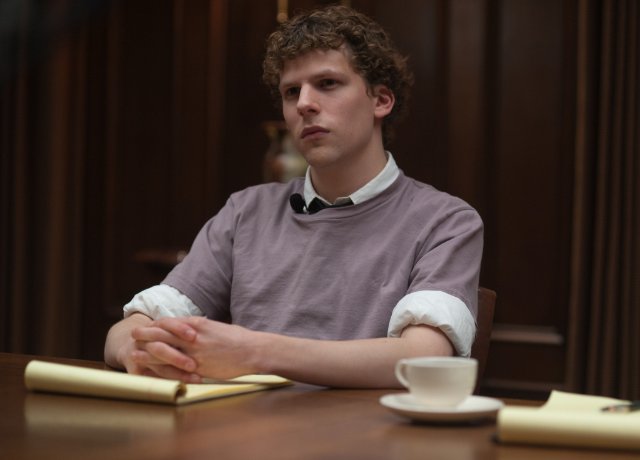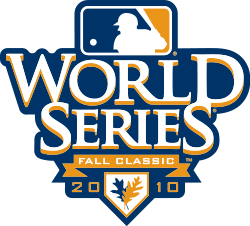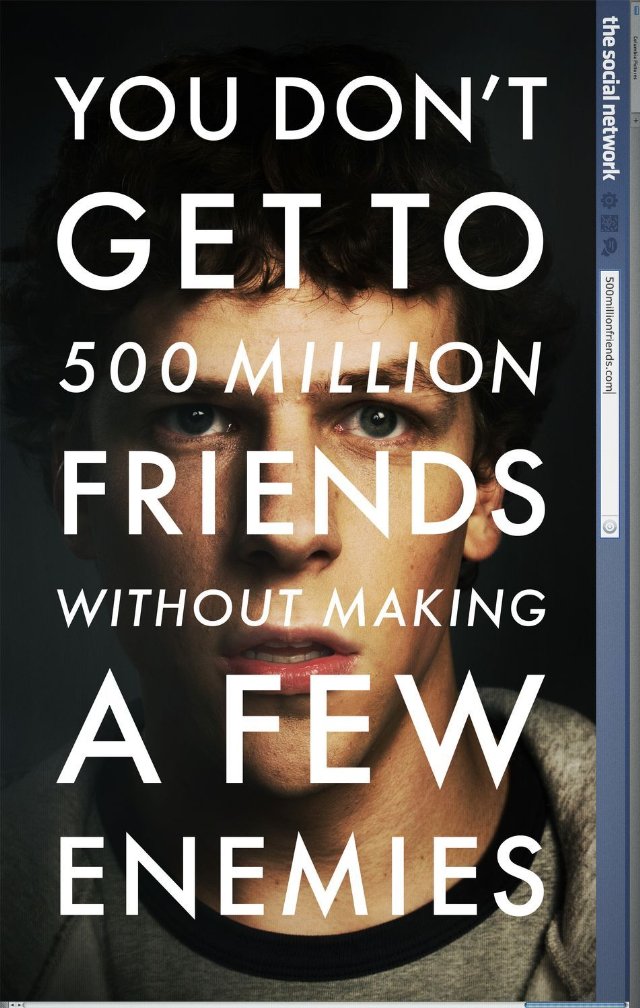Status: In theaters (opened 10/1/10)
Directed By: David Fincher
Written By: Aaron Sorkin
Cinematographer: Jeff Cronenweth
Starring: Jesse Eisenberg, Andrew Garfield, Justin Timberlake, Armie Hammer, Rashida Jones
Imagine being on the UHF program “Stanley Spadowski’s Clubhouse” and winning the opportunity to drink from the firehose, only instead of water coming out, the hose spews dialogue into your face. That’s a lot what the experience of watching The Social Network can feel like. This movie is full of words, coming at you at a mile a minute at almost all times. Jessie Eisenberg, as the onscreen personification of Facebook founder Mark Zuckerberg, does the bulk of the firehosing. He sometimes sounds like he’s rushing to spit out his lines in record time, but by the end of the film’s opening scene, you’re already used to it and totally engrossed. It takes balls to write a movie like this, and a lot of talent, too. In less-capable hands it’d come out feeling like a wordy, jumbled mess, but Aaron Sorkin is more than capable. His screenplay, which I’ve read came in at 160 pages (a typical 2-hour movie, which this is, would be more around 120), is jam-packed with dialogue spouted by fast-talking characters, and it drives the story in almost unbelievable ways.
The sniff test for me for any technology-based movie is how it deals with the specifics of its technologies, and The Social Network passes with flying colors. While Sorkin lets himself get a little carried away, particularly during a scene where Zuckerberg “interviews” interns by putting them to a hacking test while constantly feeding them shots, for the most part his characters’ dialogue is legit. We see Zuckerberg live-blog the creation of Facemash, Facebook’s predecessor, and his voice-overs describing his use of PHP, perl scripts, and wget to acquire the classmate pictures he needs from shoddily-configured Apache servers hold up. Sorkin has done his research, and it’s no surprise; you throw this much information at an audience at such a rapid pace for two solid hours, they’re going to smell it if you’re just trying to sneak stuff past them.
Based on the legitimacy of the computer-related dialogue, I have to believe that the same amount of research went into the court records that form the basis of The Social Network‘s narrative. The story is told from the perspective of two separate depositions, involving the two major lawsuits that were brought against Zuckerberg after Facebook started to take off.  The first comes from his best (and only) friend, Facebook co-founder and original CFO Eduardo Saverin (Andrew Garfield). The second is from Tyler and Cameron Winklevoss (Armie Hammer’s face on both twins, with Josh Pence providing Tyler’s body). The “Winklevi,” as Zuckerberg refers to them, had devised a website called Harvard Connection (later ConnectU) and hired him to provide programming assistance. They claim that he stole their idea and cut them out of the loop when he launched his own website. Saverin, on the other hand, claims he was unfairly squeezed out of his ownership position in the company—it was his initial $1000 investment that got it off the ground.
The first comes from his best (and only) friend, Facebook co-founder and original CFO Eduardo Saverin (Andrew Garfield). The second is from Tyler and Cameron Winklevoss (Armie Hammer’s face on both twins, with Josh Pence providing Tyler’s body). The “Winklevi,” as Zuckerberg refers to them, had devised a website called Harvard Connection (later ConnectU) and hired him to provide programming assistance. They claim that he stole their idea and cut them out of the loop when he launched his own website. Saverin, on the other hand, claims he was unfairly squeezed out of his ownership position in the company—it was his initial $1000 investment that got it off the ground.
From the retrospective view of these depositions, we get three versions of the story: Saverin’s, the Winklevoss’s, and Zuckerberg’s own account. The Rashomon style of storytelling Sorkin employs works well for two reasons. First, it gives a natural excuse to jump around in the story, to skip to the interesting parts of Facebook’s tumultuous early years. Second, it provides a clever way to avoid any claims of libel or of fabricating details; in getting three different points of view on the events, things are left just ambiguous enough to avoid being slanderous.
 That’s a good thing, because The Social Network doesn’t exactly paint a pretty picture, particularly of Zuckerberg. It does, however, give him a fair shake; he’s depicted as an insanely driven kid who happens to have a knack for knowing what people want out of the new online experience he’s trying to create. But like most stereotypical computer geeks, he lacks in social skills, to the point of ignoring the desires or feelings of anybody else he’s involved with. He’s smart, that’s clear, though I’m not sure why he’s always referred to as a “programming genius”—Facebook is the most standard, typical, and simple website you could make, technology-wise. But that’s not where Zuckerberg’s genius lies; it’s not how he does it that’s impressive, it’s the instinct he has for what to create that makes Facebook an instant success.
That’s a good thing, because The Social Network doesn’t exactly paint a pretty picture, particularly of Zuckerberg. It does, however, give him a fair shake; he’s depicted as an insanely driven kid who happens to have a knack for knowing what people want out of the new online experience he’s trying to create. But like most stereotypical computer geeks, he lacks in social skills, to the point of ignoring the desires or feelings of anybody else he’s involved with. He’s smart, that’s clear, though I’m not sure why he’s always referred to as a “programming genius”—Facebook is the most standard, typical, and simple website you could make, technology-wise. But that’s not where Zuckerberg’s genius lies; it’s not how he does it that’s impressive, it’s the instinct he has for what to create that makes Facebook an instant success.
What the movie really boils down to is a story about ego and greed. When Zuckerberg meets Sean Parker (Justin Timberlake), one of the founders of Napster, he adopts the angst-filled party-boy’s worldview, happy to give venture capitalists the finger (literally) because he knows that they need him more than the other way around, and he revels in flaunting his newfound status. He turns his back on his friend not out of spite, but out of ambition, and the way Sorkin’s screenplay handles the relationship between Zuckerberg and Saverin—showing both perspectives, eliminating any questions of malice—is more measured than the version in Ben Mezrich’s book The Accidental Billionaires—the film’s primary source—which is told a bit more subjectively from Eduardo Saverin’s point of view.
There are two things that I found really refreshing about The Social Network. For one, although it’s a big-budget movie (and surely an awards-season contender), it doesn’t feel like a typical “tentpole” release. David Fincher’s direction is elegant and classy; the performances are highly characterized, but none feel over-exaggerated; there are great special effects, but you’d never realize it from watching the movie; even the score, by Trent Reznor, appropriately sets the pace and tone without drawing unnecessary attention to itself.
The other thing, the thing I really liked, is how the film makes no attempts to depict Facebook as super-relevant to culture in general, or to over-state its importance. It’s telling a story about a kid who found success at a young age and let it get to his head, and it leaves things at that. Yes, the success he achieved is by coming up with something that seemingly everybody wants to use—and use a lot—but we never get any speeches about some supposed importance of the website itself. It’s just the vehicle by which these characters embark on their journey. (Timberlake’s Parker does get a little carried away with the overarching cultural significance of what they’re doing, but it’s in character for him, it’s not the film itself telling us we should recognize this supposed “greatness.”) What’s amazing, and impressive, and downright enjoyable, is that The Social Network resonates more because of this. It’s a timely story, yes, but it’s one about truths of human nature that apply universally.
Comments Off on Baby You’re a Rich Man
I’ve got one thing to hang my hat on with my 2010 baseball predictions: I said that it’d be a year defined by pitching, and I think that held true. Mark Buehrle started the season off with an amazing play on opening day, and things only got better from there. We saw 2 perfect games this year, one in each league: Dallas Braden in the American and Roy Halladay in the National League. These were 2 of the 5 no-hitters thrown this year, the most in a single season since 1991. Interestingly, only two of these pitchers don’t have tee times right now (Halladay of the Phillies, and Matt Garza of the Rays).
And then, of course, there’s the perfect game that never was, thrown by Detroit’s Armando Galarraga. I think that kid gained a lot of fans, though, including myself; I was shocked and impressed by how classy he was in shrugging off an incident that would’ve sent countless other professional athletes into a childish foot-stomping fit. So really, there were 6 no-hitters thrown this year, though only 5 of them will count in the record books.
This is the kind of stuff you start to pay closer attention to when your team is clearly out of playoff contention nearly from the start of the season. You also look to find other gems—seeing #1 prospect Jason Heyworth’s debut with the Braves, for instance. Or you take an unreasonable amount of pride in the fact that Marlon Byrd won the All-Star Game (single-handedly, as I recall it) for the National League. Or you gain an interest in your team’s farm system, hoping to have something to look forward to in the future. After their annual trip to San Francisco in early August, though, I had little to keep me interested in the Cubs, and gradually stopped paying attention altogether as their roster looked more and more like their triple-A affiliate, the Iowa Cubs, than it did a big league team.
So maybe you start to follow another team. Living where I do, I go to a dozen or so Giants games a year as it is, only cheering against them when the Cubs are in town. (One of my favorite things to do is to go when the Giants are playing other NL Central teams, which I’m quite used to rooting against anyway.) As it happened this year, right around the time I was giving up on following the Cubs, the Giants began to make their playoff push. And as luck would have it, they went ahead and traded for a likable Cubs player in Mike Fontenot to make me feel like I had more of a connection. (Megan already felt the same way, since her former favorite Cub, Mark DeRosa, had been traded to the Giants last year—even though he missed this entire season with a wrist injury, we can still enjoy seeing him in the dugout.) It’s still not the same, mind you—3 years ago at this time I had tickets to watch post-season baseball at Wrigley, and while I’m really excited to attend some playoff games at AT&T Park, I know it won’t equal that experience. I’ll do my best to hold down my spot on the Giants bandwagon, though.
Fan Stats
For the reasons mentioned above and a few others, I didn’t follow the Cubs nearly as closely as I did last year. The good news is that the Fox Saturday blackout rules seem to have been relaxed, so I could watch day games on WGN even though my local Fox channel was carrying a nationally-televised game. The bad news is I didn’t take advantage of this as much as I would have in other seasons. The whole breakdown goes like this:
- I went to 2 games of the 4-game series the Cubs played in San Francisco
- I watched 84 games on TV
- Of these, 70 were thanks to the Extra Innings package
- Of those, I was able to watch the Cubs feed for 54 games
- That means I only had to watch the opposing team’s feed for 16 games
- There were 14 games I would’ve seen anyway, even if I didn’t spring for Extra Innings:
- 4 games I watched at a bar
- 4 games were televised on ESPN
- 6 games I got on my local channels
- Of these, 70 were thanks to the Extra Innings package
- I listened to 25 games on the radio
- Of these, 2 were on a local radio station
- I listened to only 4 games on XM in the car
- I followed 10 games at work via the MLB.com At-Bat program
- For 9 games, I went half-and-half between XM and MLB.com At-Bat
- Of the 51 games I missed entirely, they break down like this:
- 4 were due to the Fox Saturday blackout
- 1 was due to being at a Blackhawks game
- 15 were due to traveling, being on vacation, or having friends in town
- 3 were the fault of work getting in the way of a day game I would’ve otherwise followed
- And of course, particularly towards the end of the season, I missed 28 games out of complete indifference
So my “fan rate” this year was only a measly 68.5% (I followed, one way or another, 111 out of the 162 games). But then again, it’s not like the Cubs did a lot to earn my support this season. Their best month of the year was September, when they went 17-9, and I only paid attention to 6 of those games. So it goes.
Regular Season Reflections
My predictions were actually pretty good in the National League, as far as playoff teams go, at least: I had the Giants and Phillies winning their respective divisions, and pegged the Braves as the Wild Card team. I had the top two teams in the Central reversed, thinking the Reds would make a big jump this year but underestimating just how big it’d be.
In the American League, I didn’t fair nearly as well. The only playoff team I got correct was the Yankees, but I had them winning the East instead of the Wild Card. Their division went to the Rays, who I greatly undervalued. I had the Central jumbled up, picking the Twins to finish 3rd. I did the same thing with the Rangers in the West, a division I had almost completely upside-down.
So 4 out of 8 overall, which I suppose isn’t too bad. I’m pleased to find that for once, the league I follow more closely (the NL) was the one for which my predictions seemed to be more accurate. Maybe I’m learning.
Playoff Predictions
Having a fairly strong case of Giants Fever means it’s tough for me to objectively predict this year’s playoffs, but I’m going to give it a shot.
- ALDS:
 vs.
vs. 
I think the Rangers fall into the “just happy to have made it” category, though with their lineup they’re always dangerous. The Rays were the best team in the AL this year, so I don’t think they’ll have much trouble winning it in 4. - ALDS:
 vs.
vs. 
The Yankees seemed happy to settle for the Wild Card and a matchup with Minnesota, a team they’ve handled well in recent years, but I think home field advantage will prove to be the deciding factor in this series, and the Twins will take it in 5 games. - NLDS:
 vs.
vs. 
Like the Rangers, I think the Reds are a team that blew its load just to win their division. Also like the Rangers, they have a powerful lineup but a pitching staff that I can’t see carrying them through a Division Series. The Phillies are just too strong, and I think they’ll sweep it in 3. - NLDS:
 vs.
vs. 
While I’m glad that Derrek Lee gets to play in the post-season, I think that’s as far as he’ll get. The Giants won their division on the final day of the regular season against the one team they’ve really struggled against this year, so I think they’ll handle the Braves in 4 games. - ALCS:
 vs.
vs. 
The Rays are strong, and they’ve been here before, but I think it’s the Twins‘ time to make it to a World Series. I’m giving them the edge in a tough 6-game series. - NLCS:
 vs.
vs. 
If this series comes to be, it’ll be the highlight of this post-season. While I think the Phillies can never be counted out, I think it’ll be the Giants‘ pitching staff—particularly their bullpen—that can give them the pennant in a classic 7-game series. I said it’d be a year defined by pitching, and this series should end up being the pitching showcase of the year—though both teams have plenty of power at the plate, too. - World Series

 vs.
vs. 
I said at the start of the season that I’d much rather see a Giants-Tigers matchup than a repeat of last year’s Phillies-Yankees, and while I was wrong about the Tigers this year, a series between the Giants and the Twins would come pretty close (but of course Yankees-Phillies remains a possibility, too). I’m going to stop myself short of predicting the outcome; if this series happened, I’d likely be spending thousands of dollars to attend a couple of games, and thus would literally have too much invested in it. I’d actually give the Twins the edge on paper, but the emotional side of me says the Giants can put 4 games together out of 6 or 7.
Maybe some of this is wishful thinking, but it’s nice to at least have a vested interest this year. I don’t mind riding the bandwagon, especially if it means I get to see the World Series played in person.
The Cubs are totally positioned for next year, anyway.




